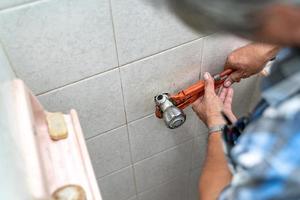New Homeowner's Guide to Bathroom Plumbing: Best Advice
New Homeowner's Guide to Bathroom Plumbing: Best Advice
Blog Article
Just about everyone will have their own individual opinion about Essential DIY Bathroom Plumbing Tips Every Homeowner.

For new property owners, understanding and keeping shower room pipes can conserve both time and money by preventing costly concerns down the line. Right here are some essential restroom pipes suggestions to assist you keep whatever running efficiently.
Acquaint Yourself with the Main Shut-Off Valve
Understanding where the major water shut-off shutoff lies in your home is important. This enables you to swiftly shut off the water supply in case of major leaks or throughout pipes emergency situations, stopping considerable water damages.
Regularly Inspect for Leakages
Tiny leakages can cause huge problems. Routinely check under sinks, around toilets, and near pipes fixtures for any indicators of leaks. Try to find dampness, small drips, or rust. Capturing and repairing leakages early can protect against more significant damages and save water.
Don't Disregard Slow Drains
If your sink or bathtub is draining gradually, it's commonly an indication of a blockage developing. Addressing this very early can stop a total blockage. Utilize a plunger or a plumbing's snake to remove particles. Prevent using chemical drain cleansers as they can harm your pipes over time.
Know What Not to Flush
Commodes are not waste disposal unit. Prevent purging anything aside from bathroom tissue and human waste. Things like wipes, feminine hygiene items, and cotton swabs ought to be gotten rid of in the trash to avoid clogs and sewer back-ups.
Set Up Strainers in Drains
Location strainers in your sink and bath tub drains pipes to capture hair and other particles before they enter your pipes system. Cleaning up the filters consistently will assist prevent build-up and keep water moving freely.
Keep Your Water Heater
Guarantee your water heater is readied to an appropriate temperature level (generally about 120 degrees Fahrenheit) to avoid hot and decrease power usage. Flush the container yearly to get rid of sediment build-up, which can reduce the effectiveness and lifespan of your heater.
Upgrade Your Components
If your home has older fixtures, think about updating to more reliable designs. Modern bathrooms, showerheads, and taps are developed to use less water while supplying excellent pressure, which can substantially reduce your water expense and ecological footprint.
Beware with Do It Yourself Plumbing Fixes
While it's alluring to handle all home repair work by yourself, be cautious with pipes. Some concerns could require professional experience, especially if they include major water lines or sewage system repairs. Hiring a professional can in some cases be a lot more cost-effective than DIY, particularly if it stops more damages.
Plan For Winter
Shield your pipes from freezing during cold weather by insulating pipes in unheated areas like basements, attics, and garages. During extreme chilly, let cold water drip from taps offered by revealed pipelines to help avoid freezing.
Schedule Normal Maintenance
Take into consideration scheduling yearly examinations with a certified plumber. They can identify concerns that you may miss, such as concealed leakages or wear and tear on pipes and fixtures. Regular upkeep helps prolong the life of your plumbing system and can prevent emergency situations.
Verdict
Understanding and keeping your home's shower room plumbing can prevent several usual problems. By following these important tips, you can ensure your restroom continues to be useful and reliable, conserving you money and time over time.
Essential Plumbing Tips for Homeowners: Keep Your Pipes Flowing Smoothly
As a homeowner, understanding the basics of your plumbing system can save you time, money, and a lot of headaches. Plumbing issues can range from minor annoyances like dripping faucets to major problems like burst pipes that cause significant damage. This guide provides essential tips to help you maintain your plumbing system and tackle common issues.
Understanding Your Plumbing System
Supply System: Brings fresh water into your home from a municipal source or a well. Drain-Waste-Vent System: Removes wastewater and vents sewer gases outside. Fixtures and Appliances: Includes sinks, toilets, showers, dishwashers, and washing machines. Basic Maintenance Tips
Regular Inspections: Periodically check for leaks, corrosion, and other signs of wear and tear. Look under sinks, around toilets, and near water heaters. Know Your Main Shut-Off Valve: In case of a major leak, you’ll need to shut off the water quickly. Ensure everyone in your household knows where the main shut-off valve is located. Prevent Frozen Pipes: In cold climates, insulate exposed pipes and let faucets drip during extreme cold to prevent freezing. Use Strainers: Install strainers in sinks and tubs to catch hair, food particles, and other debris that can cause clogs. Common Plumbing Issues and Solutions
Clogged Drains:
Prevention: Avoid pouring grease down the drain and use drain screens to catch debris. DIY Fix: Use a plunger or a plumbing snake to clear minor clogs. For stubborn clogs, a mixture of baking soda and vinegar can sometimes help. Leaky Faucets:
Prevention: Replace washers and seals regularly. DIY Fix: Turn off the water supply, disassemble the faucet, and replace worn parts.

Order Repair Report this page